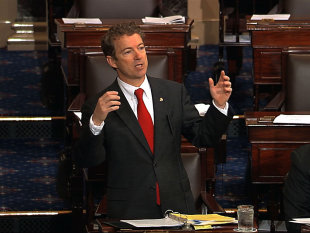 This video frame grab provided by Senate Television shows Sen. Rand Paul, R-Ky. engaged in his filibuster on the??Whatever Republican Sen. Rand Paul tried to accomplish this week with his 13-hour filibuster of John Brennan's nomination to head the CIA, it had no immediate effect on President Barack Obama?s controversial drone war. And the overall impact of the tea party-aligned Kentucky lawmaker's audacious protest is still an open question.
This video frame grab provided by Senate Television shows Sen. Rand Paul, R-Ky. engaged in his filibuster on the??Whatever Republican Sen. Rand Paul tried to accomplish this week with his 13-hour filibuster of John Brennan's nomination to head the CIA, it had no immediate effect on President Barack Obama?s controversial drone war. And the overall impact of the tea party-aligned Kentucky lawmaker's audacious protest is still an open question.
Opinions vary widely on Paul's dramatic gesture. Did he take a heroic stand against Obama?s unconstitutional and outrageous assertion that he can target Americans on U.S. soil with deadly force like drone strikes without trial?
Or did he wage a pointless campaign to undermine the president?s power to combat terrorism while proving what we already knew: The U.S. government has neither the legal authority nor the inclination to rain missiles on your house just because your screen name is OBAMASUX and you once made a birth certificate joke online?
Paul's performance was the undeniable highlight of a debate that has shined an unusually bright light on Obama?s policy of targeting suspected terrorists overseas?including Americans?for assassination. (The media have boiled down that policy to its flashiest component: missile strikes from unmanned aerial vehicles, known as drones.)
But one thing seems clear: Paul's filibuster had no significant impact on the daily conduct of the drone war.
?Sen. Paul?s 13 hours on the Senate floor won?t have any practical effect on our policy and how we?re going after terrorists on a day-to-day basis,? a senior administration official told Yahoo News on condition of anonymity.
But didn?t Paul wring a letter out of Obama's top lawyer, Attorney General Eric Holder, in which he effectively promised that Americans who aren?t lining up to take a shot at the Capitol with a grenade launcher (to paraphrase the senator) are safe?
In a word: No.
During his 13 hours on the Senate floor, Paul repeatedly asked whether Obama believed he had the authority to kill an American, on U.S. soil, who was not ?actively attacking? America.
The question prompted Holder to respond.
?Dear Senator Paul,? Holder said in a 43-word letter. ?It has come to my attention that you have now asked an additional question: ?Does the President have the authority to use a weaponized drone to kill an American not engaged in combat on American soil?? The answer to that question is no.?
Holder didn't use the phrase ?actively attacking.? And administration officials privately agreed on Friday that ?not engaged in combat? was the key phrase going forward. None of them agreed to define the expression on the record.
Why the concern? Paul himself raised some of those questions in his filibuster.
?Will we use a standard for killing Americans to be that we thought you were bad, we thought you were coming from a meeting of bad people and you were in a line of traffic and so, therefore, you were fine for the killing?? he said. ?That is the standard we're using overseas. Is that the standard we're going to use here??
Holder?s letter doesn't answer that question. And observers from across the political spectrum made that point in the aftermath.
The filibuster drew bipartisan support. There was Republican Sen. Marco Rubio, with whom Paul could contend for the party?s 2016 presidential nomination. And there was Democratic Sen. Ron Wyden, who has pressed the administration for months to disclose its legal rationale for targeted killings.
The question now is whether Paul?s actions are part of a cresting tide of questions about those policies, or the high-water mark.
Overseas, drone strikes arouse deep public anger, notably in countries with large Muslim populations?much as the Iraq War did. A formal 2006 study by America?s intelligence community found that the Iraq invasion and occupation was creating terrorists faster than U.S. forces could take them out. It?s not clear whether the same thing could be happening with drones.
Administration officials said Obama wants to work with Congress to set some rules of the road when it comes to drones. They know that while the U.S. has a near-lock on their use today, it won?t be long before a rising power like China may acquire both the necessary technology and the willingness to use it.
?We must enlist our values in the fight,? Obama said in his State of the Union address. ?I recognize that in our democracy, no one should just take my word for it that we?re doing things the right way.?
He added, ?I will continue to engage Congress to ensure not only that our targeting, detention and prosecution of terrorists remains consistent with our laws and system of checks and balances, but that our efforts are even more transparent to the American people and to the world."
So where does Paul's filibuster fit in?
?It was a very public reminder that there are a lot of people out there, on both sides of the aisle, with questions about our operations and the legal analysis that underlies them,? the anonymous senior administration official explained. ?Senior U.S. officials have given speeches and testified and briefed on the Hill, the president has talked about it in the State of the Union, and you?ll see us continue to try to be more open about our policy when it comes to targeted operations.?
iTunes Alfred Morris weight watchers fandango kobe bryant google play Christmas Story
No comments:
Post a Comment
Note: Only a member of this blog may post a comment.